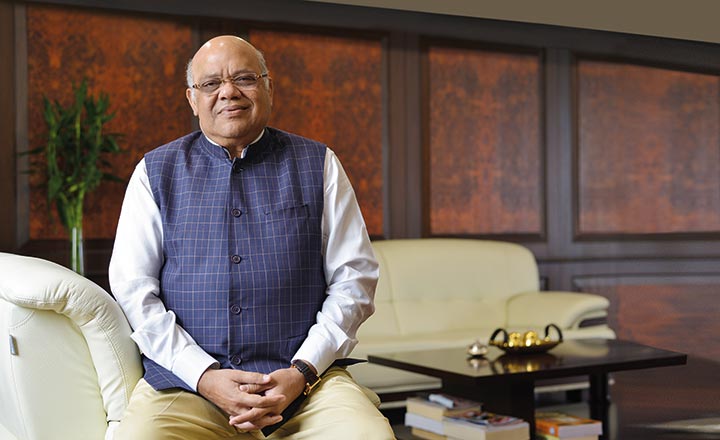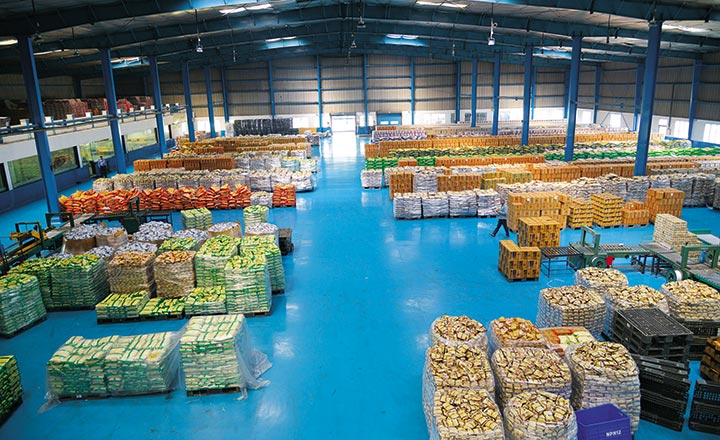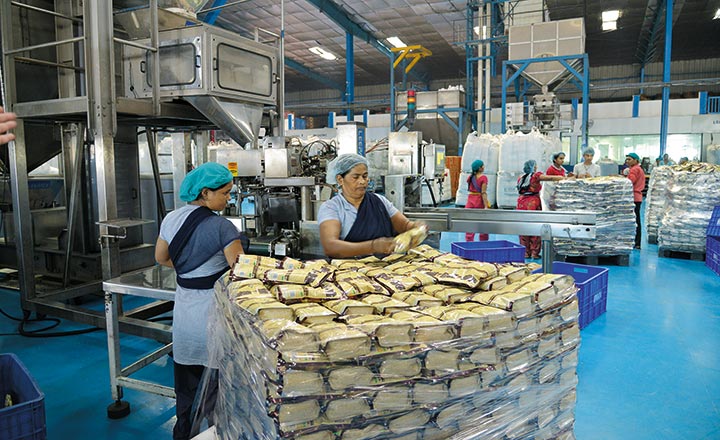When basmati rice manufacturer, KRBL introduced ‘India Gate Classic’ in 2008, it was the beginning of a revolution. The top-notch quality and taste of the new Pusa 1121 variety took the market by storm making KRBL the largest branded basmati rice company in India. However, this was just one among the many memorable moments during KRBL’s 120-year long journey. The legacy of Khushi Ram & Behari Lal which started in 1889 in Pakistan has been carried forward by the three third-generation brothers, Anil Mittal, Arun Gupta and Anoop Gupta. Today, KRBL is the world’s largest rice miller and exporter. Its flagship brand ‘India Gate’ is the market leader in several of the 73 countries where it spreads the aroma of basmati rice. The company hopes to clock a revenue of nearly Rs.6,000 crore over the next five years on stronger demand from international markets
KRBL is a story that spans over a century. It has seen the ebbs and flows of time and has moved ahead through it all to become the world’s largest basmati rice miller and exporter. Khushi Ram & Behari Lal, the eponymous company named after the two brothers who started it in 1889 in Lyalpur, Pakistan, is today headquartered out of Noida and has abbreviated its name to KRBL. Along the 120 years of its journey, the company witnessed milestones of Indian history shaping the course of its business too. Today, KRBL has a 25% share in branded basmati rice exports and more than 30% share in the domestic market. Around 48% of its revenue comes from the domestic market and the international markets bring in the rest. The Middle East, its largest overseas market, contributes around 44% to overall revenue.
India calling
Initially, when KRBL started in 1889, the company was into cotton and food grains. The company was doing well, with its ten cotton spinning mills, two rice mills and a bank. Following the India-Pakistan partition in 1947, the company had to start from the scratch since they relocated to India. “To cut a long story short, our family came to India, some of the members went to Punjab, Haryana and, we came to Delhi. In Pakistan we were quite rich. But when we came here we didn’t have anything. We had to start from scratch,” says Anoop Gupta, joint managing director and promoter at KRBL. The 58-year-old, who helms the company currently is the youngest of the three brothers. It was only in the 1970s that India became a rice surplus country and the company started restructuring itself to focus on the rice business. Gupta gives major credit to Anil Mittal, his elder brother and chairman of the company for the farsighted move. In 1978-79 when the Morarji Desai government allowed rice exports, the brothers started supplying rice to exporters.
In 1979, with a capital of Rs.500,000, the brothers were determined to find a foothold in the market. Within three to four years, they identified their niche — the aromatic and long-grained basmati rice. “We were suppliers to all exporters. We were offering them credit and a good price, so we thought why don’t we export ourselves,” Gupta says. So in 1984, the company started direct exports. “But we found that the consistency in quality comes only if you are a fully integrated player,” says Gupta. So, in 1992, KRBL spent Rs.25 lakh in installing a basmati processing plant in Ghaziabad with a capacity of 45 metric tonne (MT)/hour, exclusively for exports, hence moving up the value chain. KRBL then went public in 1993 raising Rs.60 crore at Rs.25 a share.

In 1999, KRBL started branding its rice under ‘India Gate’. The brand notched up sales worth Rs.12 crore in its first year in the domestic market and in FY16 it has reached an impressive Rs.1,800 crore. The company was one of the first in the industry to form an association with Pusa Institute (also known as the Indian Agricultural Research Institute) for developing better varieties of basmati. In 2004, a major share of its success was thanks to a new seed variety, which Pusa gave them on a trial basis.
The institute had given them a one kg sample of a new variety of rice called ‘Pusa 1121’. KRBL boiled half of it to test its quality and kept the remaining half to multiply it in its seed farm. “We cooked it and found that the rice was of excellent quality,” remembers Gupta. Mittal was sure that the rice, once introduced in the market, would sweep away the others. “Three years — from 2004 to 2007 — all we did was to multiply the seed. Before we began marketing, we wanted to ensure we had sufficient rice,” Gupta says. In 2008, they launched the rice under the brand ‘India Gate Classic.’ As Mittal predicted, the rice variety was an instant hit. With the introduction of this new variety, the company saw a 31% increase in its consolidated revenue. As proof of consumer acceptability, Gupta points out that ‘Pusa 1121’ now makes up for around 70% of India’s total basmaticultivation. India Gate Classic is priced at a 15% premium over its competitors and accounts for over 50% of KRBL’s total sales. Apart from its flagship India Gate, KRBL’s other basmati brands include Nur Jahan, Doon, Telephone and Bemisal.
Topping the charts
India contributes 70% of the total global production with basmati grown in Punjab, Haryana, Uttarakhand and western Uttar Pradesh (UP). KRBL has a mill in Punjab and one in UP with a combined milling capacity of 195 MT per hour. In a high court auction, KRBL bought a plant from Oswal Agro Furane, a sick unit in Punjab in 2004 for Rs.40 crore, and invested over Rs.250 crore to refurbish it. With a capacity of 150 MT per hour, it is now the largest rice plant in the world and can process about a million tonne of paddy every year.

KRBL also has the largest base of contact farmers in the country with around 90,000 farmers cultivating about 300,000 acres. “Our credibility in the market is great. We pay the farmers within 24 hours,” Gupta notes. Around 34% of the seed supply for basmati production in India is being supplied by KRBL. It was a strategic decision by the management to switch to contact farming from the previous practice of contract farming. The company used to give seeds to farmers and buy the produce back. But the absence of minimum support price and price fluctuations in the export market were creating problems. “We commit a price to the farmer and if the demand in international market is low, then our prices fall resulting in losses. Similarly if prices move up, the farmer ends up selling his produce to someone else since there is no binding contract. So we decided to switch to contact farming where we offer them seeds and support services but the farmer is free to sell the produce to anyone who gives him the best price,” says, CEO and whole-time director at KRBL. But KRBL which knows the history of the grain grown in field, is ready to pay a premium which others would be unlikely to pay. So this way about 60-70 % of the produce comes to them.
The company which boasts of a market cap of around Rs.10,000 crore exports to almost 73 countries including the Middle East, Australia, US and Singapore. India Gate is the market leader in Kuwait (21%) and UAE (30%). It has a 12% export share of Saudi Arabia, the largest basmati market in the world.
When it comes to exports, the only notable competition comes from Pakistan, but they are battling their own set of problems. “Pakistan has a lot of policy and quality issues. We enjoy a minimum premium of $200-300 per tonne over Pakistan rice,” notes Gupta. The increasing Indian diaspora in foreign countries and Indian restaurants cropping up in European countries and the US has worked in favour of the company. In the past five years (FY12-17) KRBL has compounded revenue and profit at 14% and 40% respectively. In FY17, the company reported a net profit of Rs.399 crore on a revenue of Rs.3,155 crore.
The company over time has built up a strong distributor network both in the domestic and international markets. KRBL has 484 dealer-distributors all over India and has one distributor per country for its overseas markets, except in the US where it has one distributor for every state. Their products are available across 60,000 retail outlets in the country. Kishan Lal who runs Royal Food Products has been distributing KRBL’s rice in Tamil Nadu since 1999 and is all praise for the company. “I have been working in this industry since 1985, but I have not seen a better company than KRBL. The management, their policies as well as their approach to distributors is the best in the industry,” he says. According to him, KRBL has a 75% share of the branded basmati market in Tamil Nadu.
Brand building
The company has spent around Rs.200 crore on marketing and brand building over the past decade and today 90% of the company’s revenue come from branded rice. Apart from well-aged basmati, it sells de-oiled cakes, bran oil and generates 120 MW of renewable energy.
“Basmati rice is not a commodity,” says Manish Bhandari, managing partner and CEO at Vallum Capital Advisors. “India produces 110 million tonne of rice. Out of this, only 10 million tonne is basmati which is at least 4x more expensive than non-basmati rice. Then you have another round of segregation between aged basmati and non-aged basmati. KRBL has realised the importance of segmentation especially in terms of branding and has been investing around it,” he notes. KRBL’s warehouses in Punjab and Uttar Pradesh cover a total area of five million sq. ft. and have a total storage capacity of 600,000 MT. “With basmati rice, ageing is a big factor. India Gate Classic is aged for at least two years,” says Gupta.
Ad-guru Prahlad Kakar, who also runs a branding and entrepreneurship institute believes the success of the brand should also be attributed to its long presence in the market and quality of the rice. “It is one of the oldest brands. They started with Dehradun basmati and that was the best basmati you could get then. After that they introduced the Pusa varieties through their India Gate brand. Due to the quality of its rice it earned its reputation through word of mouth,” he says.
Gupta says, over the next five years as the market expands and capacity utilisation improves, revenue should reach around Rs.6,000 crore. “We will get to that number without incurring any additional capital expenditure,” he says. Bhandari, who has invested in KRBL, thinks it is reachable. “The business is growing at 15% and if you add another Rs.300 crore-Rs.500 crore from other products, it is achievable,” he says. “They are launching quinoa now and I think they expect revenue from quinoa to touch Rs.100 crore in about two years,” Bhandari notes.
Rising income levels leading to increased consumption of basmati along with key international markets opening up bodes well for KRBL. Iran which is one of the major importers of basmati rice had banned imports from India for five months and now the ban has been lifted. KRBL is one of the 14 companies that have been cleared by China which has opened up its rice market to imports for the first time. China is the largest consumer of rice. Gupta is clear that even as they add new offerings to their portfolio, the focus will be on making its flagship brand stronger. “Like how Dalda was synonymous to vegetable oil, we want people to identify basmati rice with India Gate.”











